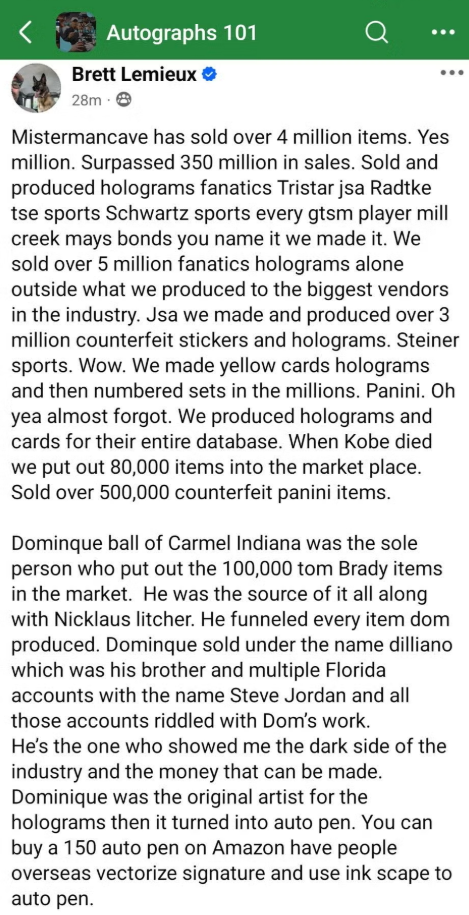
The Indiana Fake Sports Memorabilia Scandal: Behind the Counterfeit Scheme
In the often thrilling, occasionally cutthroat world of sports memorabilia, where die-hard fans pay eye-watering sums for a piece of athletic history, an undercover operation rife with deception has sent shockwaves through the community. The recent revelations surfacing out of Indiana have introduced a sinister plot twist worthy of a Hollywood thriller.
Brett Lemieux, a renowned autograph dealer whose reputation once glimmered with authenticity, has been revealed, posthumously, as the linchpin of a massive counterfeit sports memorabilia scandal. His untimely death, reportedly a self-inflicted gunshot wound, occurred during a police operation aimed at dismantling his elaborate forgery network in Westfield, Indiana.
While investigators have yet to confirm all specifics publicly, a chilling post surfaced on the “Autographs 101” Facebook group, allegedly penned by Lemieux himself. Here, in an ironic digital signature, he admitted overseeing a counterfeiting operation allegedly moving over four million fake sports items, claiming sales totaling an eye-watering $350 million. This damning revelation has sent tremors through the memorabilia community, where trust is as valued as the items themselves.
Lemieux was the man behind Mister Mancave, a business boldly asserting its dominance as having “the largest framed jersey inventory on the web.” Curiously, though it touted a Columbus, Ohio address, an actual physical storefront seemed to be as mythical as the genuine autographs it purported to sell. Lemieux’s operation reportedly dabbled in the dark arts of replication, mastering the craft of fake hologram stickers from big-name authentication corporations like Panini, Fanatics, Tri-Star, and James Spence Authentics.
This nefarious endeavor expanded to capitalize on significant moments of sport and tragedy, with perhaps the most heinous act occurring after the tragic death of basketball icon Kobe Bryant. According to Lemieux’s purported confession, the market was flooded with 80,000 counterfeit Kobe collectibles, each one embossed with holograms designed to deceive even the keenest of collectors’ eyes.
Not content with copycatting just basketball icons, Lemieux’s deceit knew no bounds. His online inventory boasted items like a notably cheaper Aaron Judge-signed baseball, complete with an apparently authentic Fanatics hologram, yet offered at a suspiciously discounted price. These deals left other vendors scratching their heads, unable to fathom how his prices could so drastically undercut the market.
Now, as the scandal spills into daylight, the memorabilia industry has entered damage control mode. Fanatics, one of the affected giants in sports collectibles, has indicated a concerted effort to stay ahead of counterfeiters, including enhancements to its hologram technology and collaborations with law enforcement and fraud experts. The goal: to pull the wool off of fakes that manage to slip through the cracks.
There is skepticism regarding the financial impact Lemieux proclaimed in his testimonial—some question the astronomical figure of $350 million. Yet, the havoc wreaked through his sophisticated forgery enterprise is undeniable. Steve Grad, a trusted voice in the world of autograph authentication, bemoans the increasing difficulty of unmasking fakes today, thanks to tools like autopens that can replicate signatures with unnerving precision.
Cynics in the industry, who had suspected something amiss, recall transactions featuring signatures of athletes who hadn’t sat down for a signing session in ages. The fallout has also caught other dealers in its crucible of controversy. Names mentioned in Lemieux’s alleged manifesto, like Indiana’s Dominique Ball and Wisconsin’s Nickolas Litscher, have distanced themselves vehemently, with Litscher even preparing legal defenses to clear his sullied reputation.
The tapestry of deceit spun by Lemieux may have operated under an ensemble of aliases—Ultimate Sports, Athletes One, Signature Dog, and All-American Authentics, among others. These alter egos helped him scatter his web of fakes across the market, making detection a Herculean task.
As this saga unfolds, the sports memorabilia community finds itself at a crossroads. Collectors eye their once-prized jerseys and balls with newfound skepticism, grappling with fears that their treasured items may be nothing but a house of cards. The scandal stands as an indelible lesson in the need for eagle-eyed vigilance and a clarion call for the industry to vigilantly evolve its defenses against fraudsters.
Amidst the shadows of this recent debacle, one can hope the industry will emerge more resilient, with fortified borders against duplicity and a renewed dedication to preserving the legacy and love for the games we hold dear.